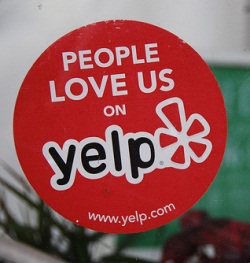 Last week, we reported on a class-action lawsuit filed in Los Angeles alleging that Yelp was running an “extortion scheme”. Today, the company has just gotten slapped by a second, similar suit, this time coming from the D’ames Day Spa of San Diego County, which is accusing Yelp of removing many positive reviews because the spa declined to run ads on the site. In a very prompt response, Yelp CEO Jeremy Stoppelman has just written a blog post titled Different Day, Different Lawyer, Same Meritless Claim: A Classic Race to the Courthouse in which he looks to debunk the new case. We’ve embedded the lawsuit below, which was posted online by The Next Web.
Last week, we reported on a class-action lawsuit filed in Los Angeles alleging that Yelp was running an “extortion scheme”. Today, the company has just gotten slapped by a second, similar suit, this time coming from the D’ames Day Spa of San Diego County, which is accusing Yelp of removing many positive reviews because the spa declined to run ads on the site. In a very prompt response, Yelp CEO Jeremy Stoppelman has just written a blog post titled Different Day, Different Lawyer, Same Meritless Claim: A Classic Race to the Courthouse in which he looks to debunk the new case. We’ve embedded the lawsuit below, which was posted online by The Next Web.
The suit claims that Yelp removed 13 out of 14 positive reviews about the Day Spa. But Stoppelman writes that the Spa has admitted that it solicited the reviews in question, which the site has repeatedly instructed businesses not to do. The suit confirms that the spa did solicit the reviews:
In or around August, 2009, LaPausky contacted GROUPON to promote her business, D’ames Day Spa, through a mass email marketing campaign. A GROUPON representative informed LaPausky that her business needed more on-line reviews and/or comments to be featured in a GROUPON marketing campaign.
LaPausky began asking her customers to leave feedback regarding their D’ames Day Spa experiences on Yelp.com. In a short while, D’ames Day Spa’s reviews on Yelp totaled approximately fourteen, many of them very positive and detailed.”
Stoppelman also writes that this is a “copy cat” suit, driven by lawyers looking to jump on the bandwagon. From Stoppelman’s post:
These copy cat suits get filed in what is known as a “race to the courthouse,” where lawyers jockey to be named the lead lawyer of the case and take the biggest share of legal fees; being among the first to file a suit increases the chance of being put in charge of the case.
So, as I said: it’s not a surprise to see another such frivolous suit. In fact, it’s kind of expected.
This doesn’t change a thing however: this suit, like the other, is without merit, we will fight it aggressively and we believe we will win.
It’s worth pointing out that even if the reviews on Yelp were admittedly solicited, that doesn’t necessarily mean the case is dead in the water — the spa can still look to prove that Yelp offered to overlook these potentially fraudulent reviews if the spa purchased ads (or that Yelp removed more reviews when the spa declined).
Update: Yelp has reminded us that they’ve explicitly denied that they ever offered preferential treatment in exchange for money.
“Simply put, Yelp does not remove or hide negative reviews in exchange for money and Yelp salespeople do not offer to do so. Additionally, Yelp treats review content equally for advertisers and non-advertisers alike. Advertisers pay for advertising and enhanced listings, and nothing more; and businesses are not penalized for declining to advertise.”